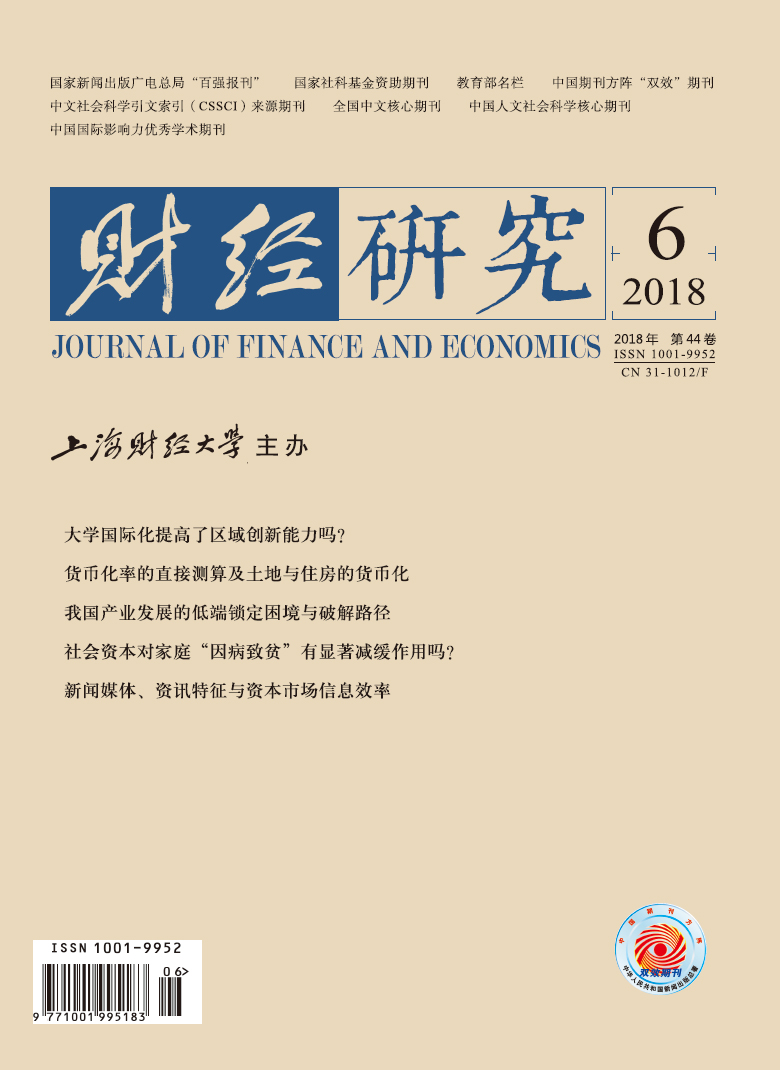对中国技术创新“迷失”的理论探讨,一般着眼于人才培养的不足或组织制度的不足两个方面,但这些理论研究都缺乏经验证据的充分支持。文章以我国近年来热度不减的考研为切入点,构建了地区高学历追逐热度指标,对高学历追逐意愿是否能够推动技术创新进行了实证分析。研究发现:(1)高学历追逐对于技术创新存在显著的推动作用,且这种推动作用是通过政府对企业的支持而间接产生的。(2)高学历追逐热度与政府对企业支持的交互作用,还部分增加了政府支持对企业创新的正面作用,并提升了企业的生产效率和创新效率。这意味着在追求高学历的地区文化氛围下,企业可以在政府的有效引导下充分发挥其对技术创新的推动作用,从而推动地区生产效率的提升。
高学历追逐会推动技术创新吗?
摘要
参考文献
3 许昊, 万迪昉, 徐晋. 风险投资背景、持股比例与初创企业研发投入[J]. 科学学研究, 2015, (10): 1547-1554. DOI:10.3969/j.issn.1003-2053.2015.10.014
6 Acemoglu D, Johnson S, Robinson J. The rise of Europe: Atlantic trade, institutional change and economic growth[J]. American Economic Review, 2005, 95: 546-579. DOI:10.1257/0002828054201305
7 Acemoglu D, Ticchi D, Vindigni A. Emergence and persistence of inefficient states[J]. Journal of the European Economic Association, 2011, 9(2): 177-208. DOI:10.1111/jeea.2011.9.issue-2
8 Aghion P, Bond S, Klemm A, et al. Technology and financial structure: Are innovative firms different?[J]. Journal of the European Economic Association, 2004, 2(2-3): 277-288. DOI:10.1162/154247604323067989
9 Almeida H, Hsu P−H, Li D. Less is more: Financial constraints and innovative efficiency[R]. SSRN Working Paper, 2013.
10 Bhagat S, Welch I. Corporate research & development investments international comparisons[J]. Journal of Accounting and Economics, 1995, 19(2-3): 443-470. DOI:10.1016/0165-4101(94)00391-H
11 Brown J R, Martinsson G, Petersen B C. Law, stock markets, and innovation[J]. Journal of Finance, 2013, 68(4): 1517-1549. DOI:10.1111/jofi.12040
12 Fan J P H, Wong T J, Zhang T. Politically connected CEOs, corporate governance, and post-IPO performance of China's newly partially privatized firms[J]. Journal of Financial Economics, 2007, 84(2): 330-357. DOI:10.1016/j.jfineco.2006.03.008
13 Guo G. Party recruitment of college students in China[J]. Journal of Contemporary China, 2005, 14(43): 371-393. DOI:10.1080/10670560500065504
14 Khwaja A I, Mian A. Do lenders favor politically connected firms? Rent provision in an emerging financial market[J]. Quarterly Journal of Economics, 2005, 120(4): 1371-1411. DOI:10.1162/003355305775097524
15 Li H, Meng L, Wang Q, et al. Political connections, financing and firm performance: Evidence from Chinese private firms[J]. Journal of Development Economics, 2008, 87(2): 283-299. DOI:10.1016/j.jdeveco.2007.03.001
16 Luo D, Ying Q. Political connections and bank lines of credit[J]. Emerging Markets Finance and Trade, 2014, 50(S3): 5-21. DOI:10.2753/REE1540-496X5003S301
17 Olley G S, Pakes A. The dynamics of productivity in the telecommunications equipment industry[J]. Econometrica, 1996, 64(6): 1263-1297. DOI:10.2307/2171831
18 Ruan J, Xie Z, Zhang X. Does rice farming shape individualism and innovation?[J]. Food Policy, 2015, 56: 51-58. DOI:10.1016/j.foodpol.2015.07.010
19 Shleifer A, Vishny R W. Politicians and firms[J]. Quarterly Journal of Economics, 1994, 109(4): 995-1025. DOI:10.2307/2118354
20 Szelenvi I. The intelligentsia in the class structure of state-socialist societies[J]. American Journal of Sociology, 1982, 88: 287-326. DOI:10.1086/649259
21 Talhelm T, Zhang X, Oishi S, et al. Large-scale psychological differences within China explained by rice versus wheat agriculture[J]. Science, 2014, 344(6184): 603-608. DOI:10.1126/science.1246850
22 Walder A G. Career mobility and the communist political order[J]. American Sociological Review, 1995, 60(3): 309-328. DOI:10.2307/2096416
23 Walder A G, Li B, Treiman D J. Politics and life chances in a state socialist regime: Dual career paths into the urban Chinese elite, 1949 to 1996[J]. American Sociological Review, 2000, 65(2): 191-209. DOI:10.2307/2657437
24 Zhou X. Economic transformation and income inequality in urban China: Evidence from panel data[J]. American Journal of Sociology, 2000, 105(4): 1135-1174. DOI:10.1086/210401
引用本文
丁重, 邓可斌. 高学历追逐会推动技术创新吗?[J]. 财经研究, 2018, 44(6): 18-30.
导出参考文献,格式为:





 , 1
, 1 6644
6644  6733
6733

